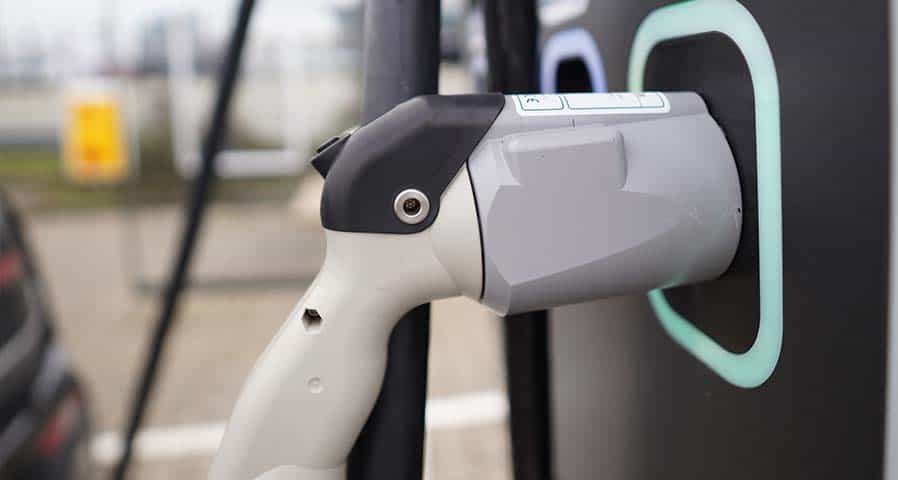Electric vehicle (EV) owners often wonder if investing in home charging is worth the time and effort. EVs typically come with a slow Level 1 trickle charger but these units may not be enough to keep the vehicle’s battery fully charged. You may consider relying on public charging stations. However, don’t forget to factor in the charging fees. These fees vary by location and time of day. At home, you know exactly what you are paying for each kilowatt hour.
Drivers still undecided if home charging is the right option will want to look at the pros and cons of public vs home EV charging. We also like to note that there is a big difference between Level 1 and Level 2 Home Chargers.
Apogee Charging Solutions does not sell Level 1 Trickle Home Chargers.
Benefits and Drawbacks of Public EV Charging
Advantages of Public EV Charging
A primary benefit associated with public EV charging stations is you are not paying for the purchasing or installation costs associated with the charger. You only pay for the electricity usage.
Something else to consider is access to fast charging stations. EV owners typically pay extra to have a Level 2 charger installed on their property. This is after the purchasing costs. At a public fast charger, you can top off your battery in minutes instead of hours.
Downsides of Public EV Charging
Even though public charging stations have benefits, you may also run into some downsides.
- You can experience long wait times at public chargers. Not only are you waiting in line for a spot, it still takes time to charge your battery. Public chargers are often best suited for quick top-offs. Using a home charger overnight can save you time.
- It’s not always easy locating public charging stations. Most are connected to online maps, but the charger may not be close to your location. Instead of driving to an unfamiliar neighborhood, you can utilize your at-home charger.
- Most public charging stations are safe to use, but some can damage your vehicle’s battery. Even though battery replacement costs are going down, it’s still an unwelcome expense. Level 2 and 3 chargers are faster than your at-home Level 1 unit, but the faster charging speeds can degrade the battery over time.
If you are interested in learning more about EV charging times, we suggest reading, A Look at EV Charging Speeds. It offers a comprehensive view of why and how your EV chargers and what speeds you can expect from any given charger.
Benefits and Drawbacks of At-Home EV Charging
At-home EV charging has several advantages and only one primary drawback. The Level 1 trickle charger that comes with your EV has a slow charging speed. It can take up to 24 hours to fully charge the vehicle’s battery. However, if you purchase and install one of our Level 2 Home Charger, you can expect a fully charged battery within 5 hours.
Advantages of At-Home EV Charging
- Charging your vehicle at home is convenient. You can charge your EV while sleeping or watching TV. You do not have to locate a charger and drive to its location every time your battery is low.
- It’s more affordable to charge your EV at home. The US Department of Energy found that charging vehicles at home only costs around $0.04 for every mile of charge. Many public stations charge more for their electricity, meaning at-home charging can help you save money. These savings can also result in a residential Level 2 EV charging station paying for itself over time.
- You can increase your home’s value by installing an EV charger. As more drivers switch to EVs, a home with a charger installed can be an attractive amenity. The added value to your home can help offset the initial charger costs.
Downsides of At-Home EV Charging
Along with the slow charging speeds of a Level 1 charger, is the potential upfront costs. Most homes have outlets that accept Level 1 chargers, but it’s not always the case if you upgrade to a Level 2 charging stations. However, the benefits of at-home EV charging typically outweigh the disadvantages.
Home Chargers from Apogee Charging Solutions
Apogee Charging Solutions offers a turn-key home charging solution. We won’t leave you hanging when you purchase one of our Level 2 Home Chargers. A certified electrician will survey your home, provide any upgrades, and install your EV charger. Get commercial grade EV charging at home with our installation experts.
To learn more about at-home EV charging, contact one of our specialists today by calling 484-816-2076, emailing [email protected], or schedule a call that fits your needs by clicking the button below.








0 Comments